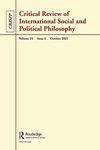康德反民主案
IF 0.9
Q3 POLITICAL SCIENCE
Critical Review of International Social and Political Philosophy
Pub Date : 2022-10-19
DOI:10.1080/13698230.2022.2133828
引用次数: 0
摘要
摘要与Cordelli的观点相反,康德合法性与民主决策之间的关系是偶然的,而不是必要的。本文从三个方面反驳了康德合法性与民主之间的联系:认为民主授权(i)不必要,(ii)不充分,甚至可能(iii)不利于合法治理。本文章由计算机程序翻译,如有差异,请以英文原文为准。
The Kantian case against democracy
ABSTRACT Contrary to what Cordelli argues, the relationship between Kantian legitimacy and democratic decision-making is contingent rather than necessary. This paper counters the connection between Kantian legitimacy and democracy in three ways: by arguing that democratic authorization is (i) not necessary, (ii) not sufficient, and indeed may be (iii) detrimental to, legitimate governance.
求助全文
通过发布文献求助,成功后即可免费获取论文全文。
去求助
来源期刊

Critical Review of International Social and Political Philosophy
POLITICAL SCIENCE-
CiteScore
1.60
自引率
0.00%
发文量
74
 求助内容:
求助内容: 应助结果提醒方式:
应助结果提醒方式:


